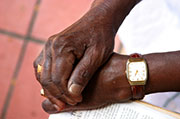
WEDNESDAY, Feb. 12, 2014 (HealthDay News) — Black Americans are much more likely than Hispanics or whites to die from a stroke shortly after having an infection, a new study finds.
“Infection before stroke appears to be most lethal for black Americans,” study author Dr. Deborah Levine, an assistant professor of medicine at the University of Michigan Medical School, said in a university news release.
“We know that African-Americans have a much greater risk of dying from a stroke than white Americans, and we wanted to know if infection — which research suggests is a stroke trigger — might contribute to this disparity,” she explained.
Researchers analyzed data on older Americans in the U.S. Health and Retirement Study, and found that blacks were 39 times more likely to die of a stroke if they’d had an infection in the previous month, while the risk was five times higher in Hispanics and four times higher in whites.
The study also found that 70 percent of blacks who died of a stroke had an infection within the previous 30 days, compared with 45 percent of whites who died of a stroke. Among blacks and whites who did not die of stroke, infection rates in the previous months were 15 percent and 19 percent, respectively.
The most common types of infections were urinary tract, skin and respiratory, according to the findings published online Feb. 7 in the journal Neurology.
It’s believed that infection can cause blood clots and fat accumulation in arteries, which can block blood supply to the brain and trigger a stroke.
“It is unclear why acute infection is more common, more lethal, or a more powerful trigger for stroke death in black Americans,” Levine said. “Genetic risks, clinical, economic or environmental factors, and differences in access to health care are potential reasons.”
Further studies are needed to better understand this disparity, Levine said.
Black Americans are twice as likely as whites to die of stroke, the study authors noted in the news release.
More information
The U.S. National Heart, Lung, and Blood Institute has more about stroke.
Copyright © 2026 HealthDay. All rights reserved.

